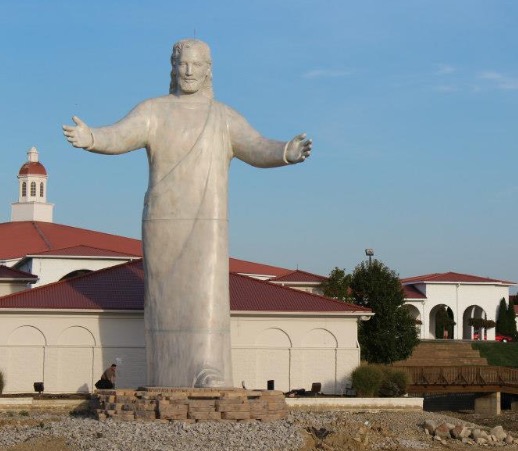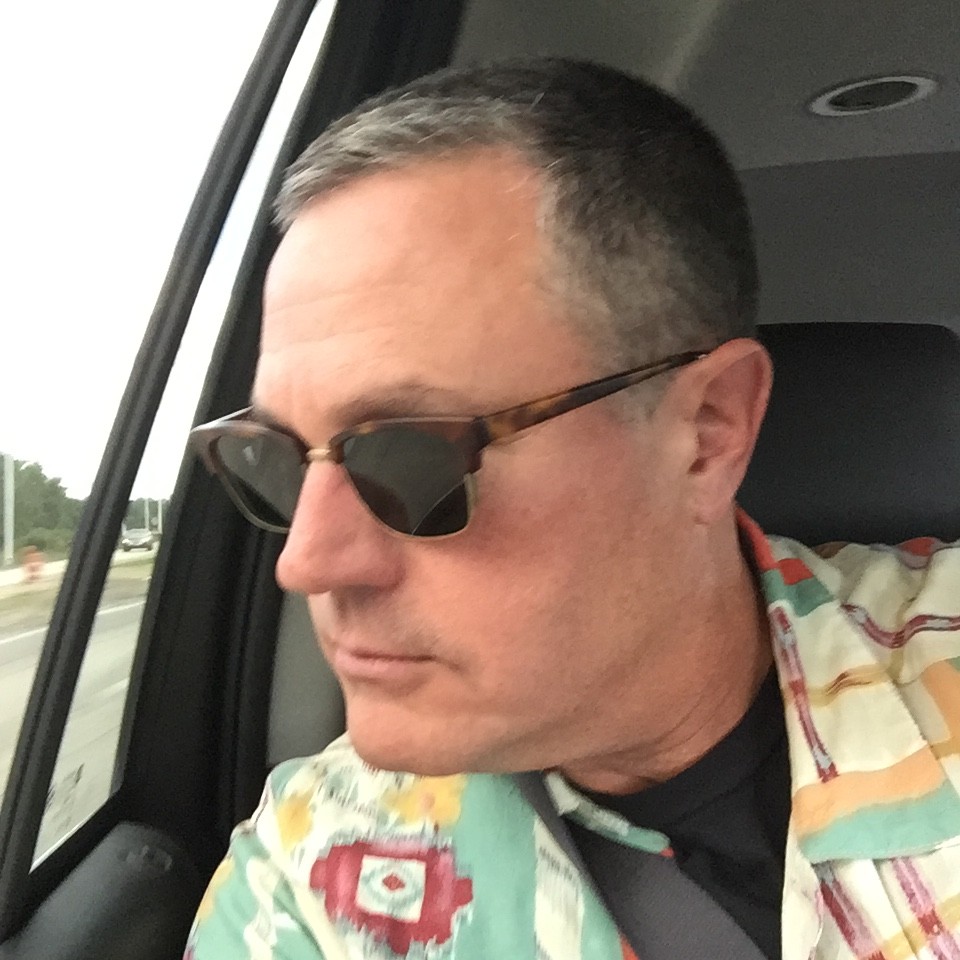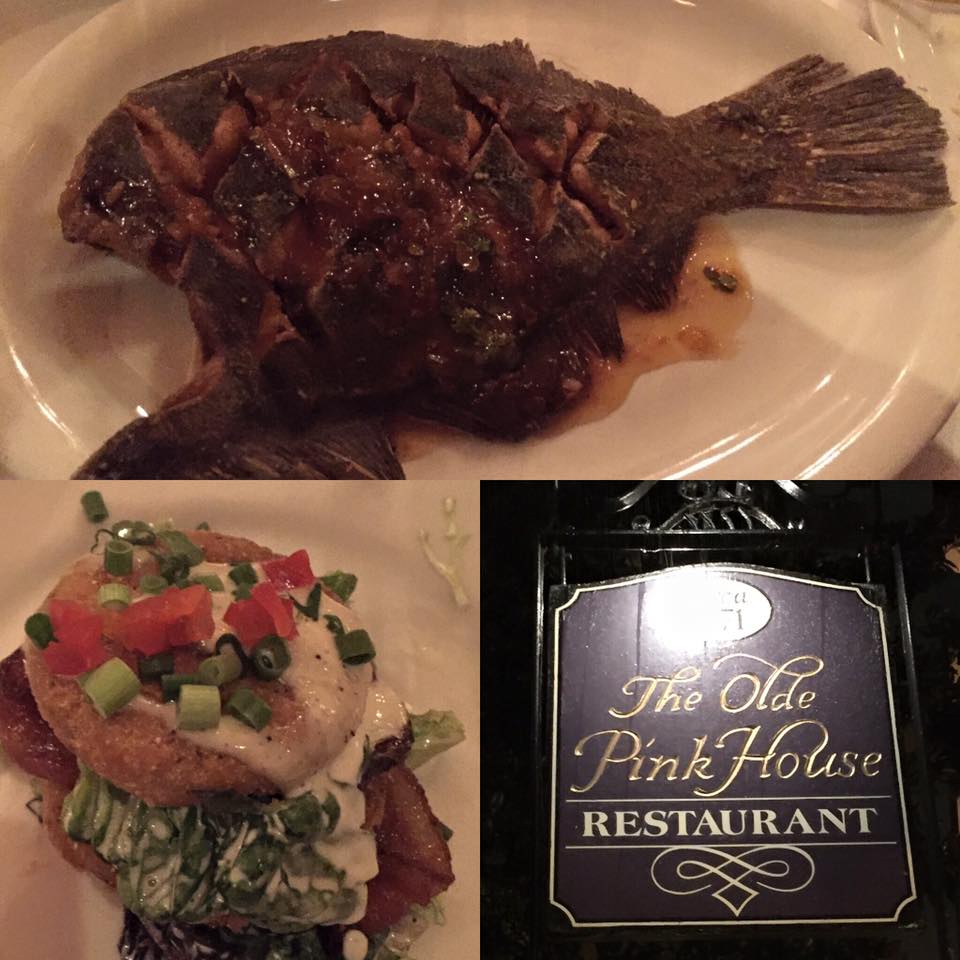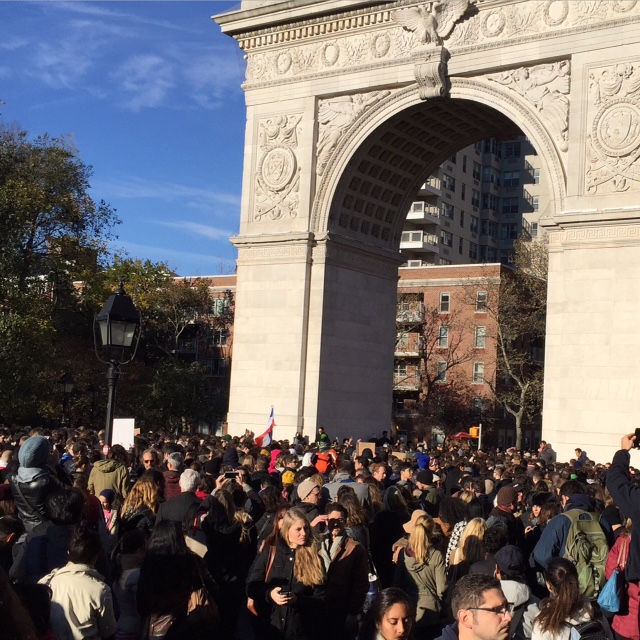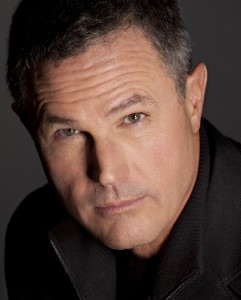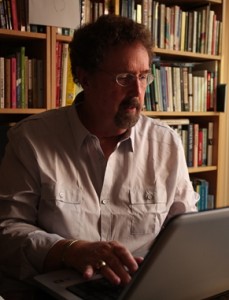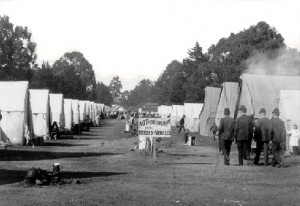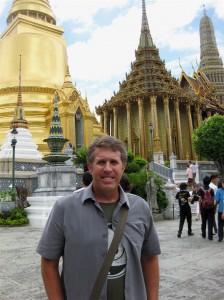Crais went on tour right before the holidays, and will appear tomorrow (Saturday) at the Santa Monica Public Library at 3 p.m., as part of the library’s 125th anniversary celebration. But first, he was kind enough to fill out my questionnaire about his adventures and provide glimpses of his life on the road.
Most unexpected experience:
The Promise debuted at #1 on the NY Times e-book list. In November. When dreadnoughts like King, Albom, and Grisham are plowing the pre-Christmas waves. I expected to be swamped.
Freakiest:
An enormous, 50-foot statue on the road from Cincinnati to Dayton. I asked my driver, “What’s this?” He said, “Touchdown Jesus. We call it Touchdown Jesus because of how the arms were raised like he’s signaling a TD.” I studied the statue, and didn’t see it. “His arms aren’t raised. They’re spread to the sides.” He nodded. “This is the second Touchdown Jesus. The first was struck by lightning and destroyed. They changed the arms when they built the new one, but he’ll always be Touchdown Jesus to me.”
Most suspenseful:
The car service hired to drive me from Vero Beach to Jacksonville flaked at the last second. It’s a three-hour drive, and I had to be in Jacksonville for a couple of live radio interviews, so the publicists really had to scramble. They found a replacement, but there was just no way we were going to make it. Too many miles and not enough time. But this new driver? This cat was Han Solo. We blasted up the highway like the Millennium Falcon. I had to, ah, close my eyes a couple of times, but we made it.
Most fun with TSA:
The TSA were great. Three different agents recognized my name, and asked about Elvis and Joe. What’s not to love?
Best meal eaten:
Flounder and fried green tomatoes at The Olde Pink House in Savannah. I’m drooling as I remember.
Most surreal moment:
The bar in the basement of the Olde Pink House. Ghosts.
Most beautiful sight:
I was in New York City when Paris was hit by the terror attacks. The next day, I happened upon Washington Square Park, which was filled with people. I don’t know how many, maybe a few thousand. Here were all these people, Americans, some of whom were waving French flags, who had come together in this spontaneous show of support for France. I found it moving and beautiful. I still do.
Favorite activity between signings:
Flying. No calls, no email, and I’m on to another event.
Favorite souvenir:
Fans brought so many wonderful gifts. Little stuffed German shepherds. Cookies to represent Elvis and Joe and Maggie. I loved them all.
All photos: Robert Crais. To stalk his snaps, follow him on Facebook and Instagram.
]]>Shane Kuhn: Word Warrior
Shane Kuhn has 20 years of experience in entertainment and advertising as a writer and filmmaker, and has paid his dues as an intern. His debut thriller, The Intern’s Handbook, was published in 2014, and a movie adaptation is in the works with Dave Franco attached to star as assassin John Lago.
Here, Kuhn discusses the sequel, Hostile Takeover; the childhood incident that led him to writing; and his encounter with a victim of gun violence.
John Lago was eight when he made his first kill. You were eight when you were grounded and started to keep a journal to vent your anger—which set you on the path to writing. Why were you grounded?
I was grounded for two weeks for (a) starting a fire in the ditch behind our house and (b) lying about it. I used to build World War II models of aircraft carriers, battleships, bombers, fighter planes, etc. And since I had an active imagination, I staged fierce and deadly battles.
On that day, I believe I was reenacting the kamikaze attack that sank an American escort carrier at the Battle of Iwo Jima. The aircraft carrier was badly damaged but I needed more dramatic effect for the grand finale.
So, I “played with matches” and set the aircraft carrier on fire. It was spectacular and really completed the scene. The only problem was the model glue in those days was highly flammable, so a small fire on the aft deck became a raging inferno and the plastic started melting in the water–still burning!
I panicked and threw water and mud all over it, but eventually fled the scene. Our neighbor had seen it and put out the fire with his extinguisher. He also called my dad to dime on me. I lied right to my dad’s face, telling him I hadn’t been in the ditch for weeks while I attempted to hide my muddy Chuck Taylors under the kitchen table.
He was furious about the fire but despised lying more than any childhood transgression, so I got two weeks in solitary. I was allowed to read, do yard work and chores around the house, and that’s it. So, I started journaling to keep from going insane and found it to be incredibly fun and immersive. I guess I have my father’s strict German discipline to thank for helping me become a writer.
You’ve said you become your characters when writing. Considering they’re assassins, have you ever scared family and friends?
When I say I become my characters, I mean I like to immerse myself into their world. It’s kind of like doing shamanic journeying. I spend a lot of time with my eyes closed, allowing their imaginary world to unfold and allowing them to speak to me. And they often do. I know a good character by the fact he or she won’t shut the hell up.
I think what is scary to people is that I want to go to those places in my mind. In person, I’m wicked laid back, like a surfer (which I used to be) or rocker (which I am). Often times, people will tell me how shocked they were when they read my work. They say if they didn’t know me, they would think I was the prince of darkness.
You’re lead singer in a U2 cover band. If the powers that be allowed you to sing a song for the movie’s soundtrack, which song would you choose?
I love this question so much because what I really want to be when I grow up is a rock star! If I could sing a cover song for the film–which I may have to try to negotiate with the studio (he says, rubbing his hands together fiendishly)–I would probably sing the U2 song “Until the End of the World” for a couple of reasons.
First, that’s where John is willing to go with Alice, and second, that song is actually about Judas betraying Jesus (U2 is a very religious band), and betrayal is a major theme in both The Intern’s Handbook and Hostile Takeover.
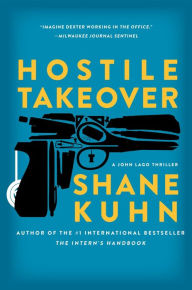 Your books’ cover designs are really clever. You tattooed the Intern’s Handbook design on your arm. Will you be doing the same with the Hostile Takeover cover?
Your books’ cover designs are really clever. You tattooed the Intern’s Handbook design on your arm. Will you be doing the same with the Hostile Takeover cover?
I LOVE LOVE LOVE my book cover art. Roberto de Vicq de Cumptich is an incredibly talented and clever designer, and I feel incredibly lucky to have had him produce those images. Obviously, or I wouldn’t have gotten a tattoo of the Intern’s Handbookart! That was done by Megan Massacre of New York Ink fame, by the way. She’s rad, too.
Both covers really nail the spirit of the work and they make you think. I am strongly considering getting a tattoo of the office supply handgun on the cover of Hostile Takeover, but there’s the small matter of deciding where to get it. It’s one thing to have a visible skull and bones on your body, but it’s quite another to have a visible gun.
Especially nowadays.
I’m very sensitive to the horrific gun violence that’s plaguing our country and would never want to make light of that in any way. I actually sat on an airplane next to one of the young women killed in the [Aurora, Colo.] movie theater shooting. She had survived another shooting incident in Canada and we talked about how terrified she was to go out in public. When I saw her picture on the cover of USA Today as a victim, it broke my heart.
I remember. Her name was Jessica Ghawi.
I don’t mean to get too political here, but the point is, this is part of what I’m considering when thinking about getting that tattoo. Megan Massacre told me that once you get a tattoo, you can’t stop at one, like Pringles or hash brownies. I said I was definitely going to stop at one, but it turns out she was right. I would like more, and I like that they will have real meaning for me. Being a novelist is a dream come true and part of my story as a warrior on this earth, so I’m proud to wear my ink!
One of the characters in Hostile Takeover, Kiana Nguyen, is based on a real person. Tell us about that.
This came about because of a contest Simon & Schuster ran, asking fans of The Intern’s Handbook to enter to win a chance at being named a character in the sequel. Kiana won, and her namesake in the book is a Wall Street suit by day, drug lord by night, a Jekyll-and-Hyde type of person featured in one of John’s more violent and fun flashbacks.
Kiana is not a drug lord or a Wall Street suit. She just graduated college and is an aspiring author! Wunderkind, my independent PR firm, ended up liking her so much they gave her–wait for it–AN INTERNSHIP! She’s working there this summer, learning the PR ropes, and evidently working on her first novel, which, based on her interesting and funny personality, will probably be great!
]]>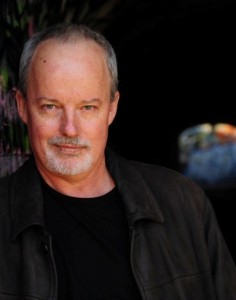
photo: Tony Mott
Australian author Michael Robotham was an investigative journalist and ghostwriter of memoirs for celebrities and politicians, among others, before publishing his first novel, Suspect, featuring psychologist Joe O’Loughlin, who’s afflicted with Parkinson’s disease. O’Loughlin has appeared in subsequent novels, two of which won the best novel category of the Ned Kelly Awards, the top Australian literary crime prize.
Robotham’s 10th novel, Life or Death (read my review here), is a standalone, about a man named Audie Palmer who, after serving a lengthy prison sentence, escapes from prison one day before he’s due to be released. Stephen King says it’s “a nerve-shredding thriller with the heart and soul so often missing from lesser crime and suspense novels.”
Why did it take 20 years between the idea for Life or Death and publication?
I first stumbled upon the idea in March 1995 when I read a small newspaper story about a man who escaped from prison the day before his release. The obviously question was why? This intrigued me as the setup for a novel, but it took me a long while to think of a compelling reason, which I knew had to involve a love story. Then it took me even longer before I felt I had the writing skills necessary to make readers believe that Audie Palmer would endure 10 terrible years in prison because of a promise he made. I am always trying to challenge myself as a writer and this was a huge challenge, not just in the writing, but also choosing Texas as the setting.
What made you choose Texas? What were some of the pleasures and challenges of capturing that Southern feeling?
I didn’t so much choose to write about Texas as choose to write about Audie Palmer and then had to find a location that I think fit his story. I spent the longest week of my life in the Ozark Mountains in Arkansas because I initially thought I might set the story there. I settled in Texas because, as the slogan goes, Texas is “like a whole other country.” It’s not just the size or the cultural diversity–it’s the food, the pride, the people and the history. What other state has its own Independence Day or bumper stickers threatening to secede? I also saw plates that said Don’t mess with Texas, but I don’t know whether that was an anti-littering message or a threat.
I spent five weeks in Texas doing the research, sitting in bars, chatting to locals and driving enough miles to get white-line fever. At the same time, I was listening to audio books by Cormac McCarthy, William Faulkner, James Lee Burke and Philipp Meyer, trying to get the rhythm of the language.
It’s a daunting prospect to set a novel in a strange place but hopefully I haven’t made too many mistakes.
Some of the scenes, especially ones involving Audie on the road, evoke a sense of music, as if they’re movie montages. If Audie’s life had a soundtrack, which songs would be included?
I’m terrible with music questions, which is why there are so few songs referenced in my novels. I should name songs like “Yellow Rose of Texas” or “Galveston” but that wouldn’t be telling you the truth. I am, however, a huge fan of Willie Nelson and Waylon Jennings, so they have to be included on any soundtrack, along with Janis Joplin’s “Me and Bobby McGee” and the classic gospel blues number “John the Revelator.”
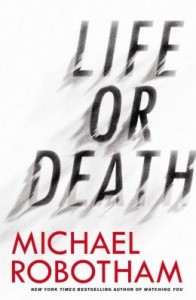 Suspect was intended as a standalone but the characters were developed into a series. Life or Death is being touted as a standalone…but is it really?
Suspect was intended as a standalone but the characters were developed into a series. Life or Death is being touted as a standalone…but is it really?
No plans as yet [to make it a series]. I do have another idea for an American novel, but might set it farther north in Maine. I have thought about bringing FBI agent Desiree Furness into a future novel. She’s a great character, so the answer is: “Watch this space.”
Tell us about your reaction when Stephen King raved about your work.
I regard Stephen King as the world’s greatest storyteller since Charles Dickens. When I read his comments about Life or Death, I said to my wife, “It won’t matter if I never sell another book. I can retire now. I will sit in my rocking chair and prepare to tell my grandchildren that the great Stephen King once called me a master.” Believe me–it doesn’t get any better than that.
Let’s hope retirement is many years from now for you. In addition to journalism, you’ve done your share of ghostwriting. One downside is that you don’t get credit for the writing, but there must’ve been perks, too.
Most people do jobs where they don’t get their name written up in big bold type. Teachers. Postmen. Surgeons. Social workers….
As a ghostwriter, I got to look at the world through a fresh set of eyes every time I took on a new project. I had to capture a new voice and immerse myself in an interesting life, performing a sort of literary ventriloquism where nobody recognized my presence. This was challenging and rewarding creatively, and also made me a good living.
Anonymity didn’t bother me because the people who counted–publishers and agents–knew which ghostwriter was responsible for a book. They gave me the credit, even if the general public had no idea.
Another perk was that I could be invisible. I didn’t have to do media or publicity. I still read all the reviews and celebrated the bestseller lists, but my job was done.
If someone asked you to write your memoir but you didn’t feel like doing it, which author—living or dead—would you choose to ghostwrite it? What would be the title?
Tough question. I guess I should be writing my own memoir, but if I had to put my life into another writer’s hands I would choose Hunter S. Thompson. Not for accuracy, but because I’m sure he’d make my memoir more exciting than the reality. And what would it be called? The Last Word.
This interview originally appeared in Shelf Awareness for Readers and is reprinted here with permission.
]]>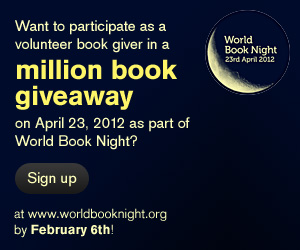 You’ve probably heard/read a lot about the World Book Night that’s happening on April 23. It’s an event involving volunteer givers who will go out into their communities and give away 20 copies of a book they love to people who might not otherwise read, or are light readers. The previous deadline to apply as a giver was today, February 1, but it’s been extended to next Monday, February 6, midnight EST!
You’ve probably heard/read a lot about the World Book Night that’s happening on April 23. It’s an event involving volunteer givers who will go out into their communities and give away 20 copies of a book they love to people who might not otherwise read, or are light readers. The previous deadline to apply as a giver was today, February 1, but it’s been extended to next Monday, February 6, midnight EST!
Carl Lennertz, Executive Director of World Book Night USA (it’s also happening in the UK on the same day), generously took some time to answer a few questions for me about this exciting event.
Pop Culture Nerd: Why was the deadline extended?
Carl Lennertz: Mostly due to the Super Bowl ad we’re going to run. Hah! I sensed people were stressing and could use a little extra time. And we had built in some time. But I can’t go past Feb. 6. We could launch now with every state very well covered, and every city—and some towns I never heard of, which is great—but I figured the more the merrier. Even if I can’t have less stress, I can offer it to others.
PCN: Can you suggest some places that would make great locations for givers to find light readers?
CL: I hesitate to answer because I want the givers to do that themselves, to let it be spontaneous and original. And they have. The public TOTALLY gets this, and it’s been amazing to see the responses. If you like, I’ll share some after Feb. 6. Okay, okay, don’t pout. My favorites run from nursing home waiting rooms to pubs, from commuter buses (to those not reading—aha!) to schools in low-income neighborhoods.
PCN: What happens if you get an overabundance of requests for some of the titles and not enough for some of the others?
CL: We’re ahead of you on that one. That’s why the givers had to make a second and third choice. A fair number of givers had a different place in mind depending on the book they got!
PCN: What are your expectations for WBN? How will you rate its success?
CL: I want all the givers to have a fun, safe, and rewarding day; for the bookstores and libraries to continue to be cherished as the community centers that they are; to get at least 100 local news stories and 2 national stories about WBN and the value of reading; to have a success that engenders some foundation money so we can grow this yearly; and ultimately, to touch the lives of a LOT of people. I won’t say change a life, as that’s a bit grandiose, but still, that would be possible. Just the gift of a book might touch the giver and recipient in some sweet or deep way.
PCN: If givers want to share their experiences about that night, is there a central message board/forum/site where they can go?
CL: I’m not as interested in any central sort of gathering point for the stories, except perhaps a WBN Flickr page. And Twitter is essentially national. But what I would love is for the year-round love and sharing to reside and go ’round locally within each community, with the bookstore or library at the center. We’re a huge country, and I’m big on regional flavor, or the flavor of communities, online or otherwise. And yes, it could all bubble up via natural interest groups, like teachers, soldiers, health care workers, government officials, caregivers of all sorts, and so on. We’ll see!
Thanks so much, Carl! And thank you to Wiley at AuthorsOnTheWeb.com for facilitating the interview.
If you haven’t applied to be a giver, go here for more info and to sign up. Here’s a list of the books that were chosen to be given away. If you’re in the UK & Eire, go here.
If you have applied, what books did you request, and why? Good luck and happy giving!
]]>But speaking of happy and new, Robert Crais‘s latest novel, Taken, drops tomorrow (Jan. 24, Putnam), and I have a Q&A with him today. The novel moved me so deeply, I almost can’t talk about it for fear of diluting the feeling. So I’ll just say a few words and force encourage you to experience it for yourself.
Taken has the usual action as Elvis Cole and Joe Pike go up against deadly human traffickers, but it’s also a story about love, friendship, compassion, and chasing your dreams. There’s a scene that defines how Joe feels about Elvis, expressed in the only way Joe knows how—wordlessly. It’s breathtaking for both its simplicity and depth of feeling, and one day, when someone compiles a list of iconic scenes in private eye novels that best exemplify the relationship between a detective and his partner, this moment must be on top. It makes you wish you had friends like them; it makes you wish you could be like them.
I’m thrilled to have Robert in the PCN house, answering questions about the different ways he’s been taken (stop snickering) and sharing his personal photos. Afterward, stick around for a little giveaway.
Pop Culture Nerd: What’s the best trip you’ve ever taken (physical or chemical)?
Robert Crais: Prowling through bear country on Admiralty Island, Alaska, and through the East Kootenay Rockies in Canada at 9000 feet before the snow melts. Dangerous, primitive, natural, beautiful. I enjoy physical outdoorsy things like mud runs, scuba diving, and the adventures I have doing research, but the isolation and purity of rugged wilderness areas like inner Admiralty and the East Kootenays call to my heart. If it’s easy to get there, I don’t want to go.
PCN: Where’s the weirdest place you’ve been taken for research?
RC: A whorehouse in Mississippi.
PCN: Huh. I noticed you didn’t send over photos of that. Speaking of which, favorite picture you’ve taken?
RC: Sunrise breaking over Los Angeles while the city sleeps.
PCN: Biggest risk ever taken?
RC: Writing L.A. Requiem.
PCN: What do you most fear will be taken from you?
RC: My mental faculties.
PCN: Best advice ever taken?
RC: Write what you love.
PCN: Biggest misTaken assumption about you?
RC: What do people assume?
PCN: I’ll ask them. Last Q—what do you hope will be taken away from Taken?
RC: That people find it exciting, gripping, moving, and truthful.
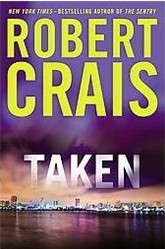 Thank you, Robert, for answering my questions. Readers, it’s your turn to be Taken. For more info, go to his website or peruse his tour dates on Facebook.
Thank you, Robert, for answering my questions. Readers, it’s your turn to be Taken. For more info, go to his website or peruse his tour dates on Facebook.
But first, I have a little giveaway. I’m giving away five Elvis Cole Detective Agency business cards with a slogan that comes straight from the novel. I won’t ruin it by showing or saying what it is. If you win one and don’t like spoilers, make sure you read the book before I send it to you!
I printed these cards myself and they are in no way official, but they will be signed by Robert. To enter, leave a comment below answering his question of what you assume about him. Be creative—the more wrong the assumption, the better!
Winners will be chosen randomly via random.org. Giveaway is open to everyone, and will end this Sunday, Jan. 29, 5 p.m. PST.
UPDATE: Winners have been announced, and the card looks like this.
]]> When I heard about Shaken: Stories for Japan, the first ever charitable e-book, I knew I wanted to help spread the word. Like everyone else, I was horrified by the disasters in Japan and, because of my childhood, I also know what it’s like to lose everything you own.
When I heard about Shaken: Stories for Japan, the first ever charitable e-book, I knew I wanted to help spread the word. Like everyone else, I was horrified by the disasters in Japan and, because of my childhood, I also know what it’s like to lose everything you own.
The anthology was conceived and edited by Edgar-nominated author Tim Hallinan, who wrote a Japan-themed short story for the anthology and got 19 of his friends to do the same. Author Gar Anthony Haywood created the striking cover. The e-book became available last week on Amazon for $3.99 and the authors are donating all their royalties to the 2011 Japan Relief Fund.
I reached out to Tim and three of the writers—Brett Battles, Naomi Hirahara, and Kelli Stanley—on Friday about doing a Q&A with me and immediately got enthusiastic yeses. Despite their busy schedules (Naomi co-chaired the California Crime Writers Conference this past weekend), they made time for my questions and even sent photos. I think I got a glimpse of the generous spirit everyone has devoted to the project.
Below, the authors discuss their experience with Shaken.
Pop Culture Nerd: If someone can afford to buy only one thing to help out Japan, why should it be Shaken instead of the various other charitable items out there?
Tim Hallinan: The book, as wonderful as it is, is a means to an end, and the end is helping people who have endured one of the new century’s most unimaginable tragedies. One strong argument in favor of the book is that we did a lot of research into the organization to which we would give the project. They had to take nothing for overhead and supervision. Some charities take as much as 40-45%, and the funds could not be regarded as fungible, meaning they couldn’t be diverted to another cause at the organization’s whim. Japan America Society not only met those criteria, but also demonstrated that the organizations to which they gave the money—already active in the disaster area—were similarly clean, were nonprofit and nongovernmental groups that would put every penny to use.
Brett Battles: Not only is 70% of the donation going directly to the relief fund, but you also get something very cool in return! And at $3.99, it’s like buying a latte at the coffee shop. Purchasing a copy of Shaken is easy, inexpensive, and good for the soul.
Naomi Hirahara: The nice thing about this project is that writers donated their time to create short stories that, hopefully, entertain. So by buying Shaken, readers will get something of value while benefiting victims of the earthquake. We [the writers], as Americans and Europeans, also attempted to make connections to things Japanese, so certainly there’s an element of intercultural dialogue going on.
Kelli Stanley: I really can’t recommend one charitable donation over another—especially if someone has more than $3.99 to donate!—but I will say this: If you enjoy reading, and if you enjoy crime fiction, I think buying and reading Shaken will give you a great deal of pleasure, as well as insight into Japan and Japanese history and culture. The experience will make you feel doubly good about being able to help! Plus, we are hopeful that the success of Tim’s idea will spur other author-driven projects for charity!
PCN: Why did you choose to write and contribute the story you did?
TH: I’ve wanted for years to set a book in the age of silent pictures, when a few people were inventing an art form and an industry at the same time. And I’ve been fascinated for years by Anna May Wong and Sessue Hayakawa, the first two Asian stars in Hollywood. I looked up the most disastrous of all Japanese quakes, in terms of lives lost, and there it was: the great Kanto earthquake of 1923, which killed more than 100,000 people and essentially leveled Tokyo. I wondered what it would be like to be a Japanese actor starring as yet another Yellow Peril villain when the news of that earthquake finally reached Los Angeles. That was the seed of the story, and the title, “The Silken Claw,” which obviously means nothing whatsoever, immediately came to me as the title of the film my hero was making when this life-changing news reached him.
Let me also say that I took one look at the first few stories that came in and rewrote mine from the first word to the last. In its original form it was nowhere near good enough to be in a book with the stories the other writers turned in.
BB: At first I considered something set in Japan, but I knew a lot of the other authors would be doing that. I finally decided I’d write a story set in the world of Jonathan Quinn, the protagonist of my [The] Cleaner series, hoping that this would interest some of the series’ fans to pick up the anthology. But I didn’t want to write a Quinn-centric story. I wanted to do something a little different. So I decided to write a story featuring Quinn’s girlfriend Orlando from back when she was just starting in the espionage business. She’s given a simple assignment by her mentor, or, at least, it sounds simple: Pick up a Japanese woman who’s just arrived from Tokyo at Los Angeles International Airport and take her to the house her husband is hiding out in. It’s not very long before Orlando realizes this assignment isn’t quite as simple as she’d been led to believe.
NH: I honestly didn’t think that I would have time to write an original story. I took a look at some old stories and essays inspired by either my family or my year of living in Japan. But they didn’t reflect who I am today as a person or a writer. So I opened the laptop and started recalling the time I lived in a tiny six-mat tatami on the western side of Tokyo. The walls were literally paper thin; I could hear my neighbor, a bachelor, turning the pages of his newspaper. But I never really saw him. I thought that could be a seed of a story reminiscent of a past Tokyo.
KS: When Tim contacted me, I’d just returned from Left Coast Crime to find that my home had been burgled. It was a very traumatic experience—one that you don’t recover from quickly—and I thought the best way I could turn the angst around was to take my sense of loss and anger and refocus it into doing some good, maybe transmute the karma! Like everyone else, I’d been following the devastation in Japan and wished I could do more to help. Writing the story helped me to deal with what I was going through, which of course was nothing in comparison to the enormous tragedy of the tsunami and quakes.
Since I write about and live in San Francisco, quakes are always in the back of my mind. We live with the fear daily, and writing about the Great Quake of ’06 seemed a natural fit. I did a bit of research on the treatment of the Japanese at that time, and discovered that the militia pressed them into slave labor. The story took shape from there. Racism and other forms of social bigotry are strong themes in my books.
PCN: Have you ever been to Japan, do you plan to visit, or know someone who’s there right now?
TH: I have friends in Japan, but they’re mostly in Tokyo or even father away from the real disaster zone. They went through a lot, and some lost friends and acquaintances. I don’t mean to minimize any of that, but it was all at a remove.
BB: I do have friends who live in Japan, but all are safe, thankfully. Shaken up, but safe.
NH: My husband and I were actually planning to go to Japan last year to celebrate our tenth wedding anniversary, but a family illness kept us stateside. In addition to living there for a year after college, I had visited Japan often as a child. Most of my mother’s relatives live in Japan, but on the southern side. I don’t know anyone who experienced direct losses, but I know many friends of friends who were affected. One of my Japanese acquaintances owns a seed company and is very worried about the future of farming in Japan due to radiation fallout.
KS: I have never been, but I really hope to visit someday. In high school, I had a Japanese pen pal. I was always drawn to the country, its beauty and traditions. I’m lucky enough to live in a city with a strong Japanese population and history, but I certainly do hope to see Japan!
PCN: What was the most surprising thing that came out of your participation in this project?
TH: The breadth of the book. I was in a special position because I was the only one who read the stories as they came in, and the only one who had read all of them before the book was finished. I was sort of staggered by the breadth of subject matter. These stories deal with every kind of earthquake—physical, emotional, spiritual. I think people figure writers are probably pretty much alike, but that’s just wildly untrue, and anyone who reads this book will meet twenty people who couldn’t be much more different and remain members of the same species.
The BEST thing that’s come out of the book for me, on a personal level, is that I’ve spent the last 8-10 weeks in the company of people who are operating from the best and most compassionate aspects of their characters. It’s been unforgettable.
BB: Without a doubt, how quickly it came together. Without the revolution in e-books, this would never have been possible. The same could be said about Tim. His relentless spirit and drive is really what made this thing happen. He saw a way to help, then put his head down and made it happen. I’ve always admired him, but even more so now.
NH: Once I chose to write from a Japanese man’s point of view, the story flowed very quickly.
KS: Probably how easy and seamless it was. Tim kept all of us informed on the various stages. We all contributed input on cover design (and isn’t Gar’s cover wonderful?), on pricing, etc. It was a team effort directed by one of the most selfless and noble people out there (and one of the best writers). So many great ideas can get bogged down, but that never happened with Shaken. Tim kept us all focused, and everyone pitched in with such incredible goodwill that the project has been an absolute joy from start to finish. And now, of course, we hope to sell as many copies as possible, to raise as much money as possible, and really appreciate you and other bloggers helping us get the word out!!
*****************
You heard what Kelli said!
A thousand thanks to Tim, Brett, Naomi and Kelli for chatting with me. For more information on Shaken, click here. To buy it, click here.
Photos provided by authors or from their websites
]]> Brett Battles’s fourth Jonathan Quinn thriller, The Silenced (Dell, 4/5/11), is about to drop so I invited him by to talk about it and the 237 other projects he has up his sleeve.
Brett Battles’s fourth Jonathan Quinn thriller, The Silenced (Dell, 4/5/11), is about to drop so I invited him by to talk about it and the 237 other projects he has up his sleeve.
First, the description for Silenced:
Quinn has a new client and an odd job: find and remove the remains of a body hidden twenty-five years ago inside a London building now scheduled for demolition.
But Quinn, his deadly and beautiful girlfriend Orlando, and their uniquely talented colleague Nate are being watched. Suddenly caught in the crossfire between two dangerous rivals who demand the remains, Quinn and his team must learn who the dead man was and why he’s still so important. Because a plot stretching from London to Hong Kong to the former Soviet Union is rapidly unraveling. And Quinn hasn’t just been hired to tie up loose ends—he is one.
Pop Culture Nerd: The launch party is this Saturday, 3/26, at Book Soup. Can you confirm if there will be cake and acrobatic chimps?
Brett Battles: While the acrobatic chimps are confirmed, I’ll have to work on the cake. Any preferences? [Ed. note: Banana nut ice cream cake!] I am very excited that The Silenced is finally coming out. I think it’s the best Quinn yet.
PCN: What did you do to him?
BB: I get into Quinn’s past, who he was before he was Jonathan Quinn. And I make his past get tangled with his present. That was a lot of fun! For me, but probably not for him.
PCN: Oh, good, I like tanglediness. Silenced isn’t the only new release you have. You just e-published two short stories and another thriller, Little Girl Gone. Only one of these has Quinn. Want to elaborate?
 BB: One of the short stories, “Just Another Job,” is a Quinn. It’s from when he was a younger cleaner and still working with his mentor, Durrie. The novel, Little Girl Gone, is the first of a new series featuring Logan Harper. All three should be available at the Kindle store and other places where e-books are sold, such as smashwords.com.
BB: One of the short stories, “Just Another Job,” is a Quinn. It’s from when he was a younger cleaner and still working with his mentor, Durrie. The novel, Little Girl Gone, is the first of a new series featuring Logan Harper. All three should be available at the Kindle store and other places where e-books are sold, such as smashwords.com.
PCN: Who’s Logan Harper and why did you decide to start another series with him?
BB: Logan is a former soldier who went into security work at a defense contractor after he finished college. While he was working there, something bad happened that got him fired and caused his wife to leave him. That’s all backstory, of course; Little Girl Gone opens two years later. Logan has moved back to his hometown of Cambria, California, and is working at an auto-repair garage owned by his almost 80-year-old father. He’s there because keeping life simple is the only thing that helps him move on from the past, a past he blames himself for but shouldn’t.
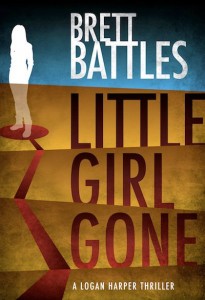 I wanted to write a series about a guy who isn’t a professional like Quinn, but who is resourceful and gets drawn into helping others. His father and his father’s group of friends are going to play a large part in finding people who need Logan’s help, whether he wants them to do that or not.
I wanted to write a series about a guy who isn’t a professional like Quinn, but who is resourceful and gets drawn into helping others. His father and his father’s group of friends are going to play a large part in finding people who need Logan’s help, whether he wants them to do that or not.
PCN: Also on deck is a YA, your 359th book this year. What inspired you to write that?
BB: Definitely my kids. I wanted to write an adventure I thought they might enjoy. It’s called Here Comes Mr. Trouble and should be out mid-April.
PCN: Can you reveal a little of its plot?
BB: A little, perhaps. Thirteen-year-old Eric Morrison thinks he might be going crazy. His whole life has suddenly turned upside down. Among other things, he’s forgetting homework, unable to get to his classes on time, and constantly getting bullied on his way home from school. Not to mention the fact that his mom is missing and his father doesn’t seem to notice. Dazed by this whirlwind of chaos, Eric finds an ad in a phone book that seems to be tailored just for him, a service for kids who are in trouble. He calls the number, but if he thought things were weird before, they were nothing compared to what’s about to happen when Mr. Trouble and the Trouble family arrive to help him.
PCN: I want to read that and I’m wayyy past being a YA. You’ve gone the traditional publishing route and now doing some e-publishing. How do you compare the two experiences?
BB: Well, I’m still very new to the whole e-publishing world, but probably the biggest difference is that instead of having to wait a year to a year and a half for my books to come out after I finish writing them, there is only a month or two, which is spent copy editing, getting a cover made, etc. I enjoy being in control of the cover design. When you’re with a publisher, they often just present you with a cover and say, “Don’t you love it?” and you’re expected to say yes.
The big thing legacy publishing has going for it is the distribution of printed books, but with fewer and fewer bookstores, and more and more people buying e-readers, that’s becoming less important. Oh, and before, if I wrote a book my agent or publisher didn’t want to bring out, I’d have to stuff it in a drawer. Now I can write what I want, throw it out there, and if it finds an audience, great! If not, no problem either.
PCN: The Romantic Times Booklovers Convention comes to L.A. next month. After narrowly losing the Mr. Romance title last year despite running around with no pants, how do you plan to campaign for it this year?
BB: I’ve made a special DVD that will be in each of the attendees’ bags. Inside five of the DVD sleeves there will be a golden ticket. Those five lucky winners will get…well, best not go into it here.
PCN: I agree. Based on what I saw on the DVD, what you have planned has been illegal in the U.S. and Mexico since 1973. Looks fun, though. Thanks for chatting, Brett!
L.A. folks, the Book Soup launch is 4 p.m. this Saturday; click here for more info about the store. Hope to see you there!
]]> Hilary Davidson‘s debut mystery novel, The Damage Done, doesn’t drop until tomorrow, September 28, but she’s already a star. Ken Bruen says in a Mulhollandbooks.com post that she’s among “a whole batch of gung ho mystery writers who believe that mystery is the new rock ’n’ roll…writing the most exciting literature this side of the Booker Prize.” Her award-winning short stories have been published in Thuglit, Beat to a Pulp, Spinetingler, among other venues. Hilary is also a freelance journalist, travel writer (she’s written many Frommer’s guidebooks) and expert on gluten-free dining. I wouldn’t be surprised if she’s a skilled trapeze artist, CIA agent and world-class discus thrower, too.
Hilary Davidson‘s debut mystery novel, The Damage Done, doesn’t drop until tomorrow, September 28, but she’s already a star. Ken Bruen says in a Mulhollandbooks.com post that she’s among “a whole batch of gung ho mystery writers who believe that mystery is the new rock ’n’ roll…writing the most exciting literature this side of the Booker Prize.” Her award-winning short stories have been published in Thuglit, Beat to a Pulp, Spinetingler, among other venues. Hilary is also a freelance journalist, travel writer (she’s written many Frommer’s guidebooks) and expert on gluten-free dining. I wouldn’t be surprised if she’s a skilled trapeze artist, CIA agent and world-class discus thrower, too.
The Damage Done is about Lily Moore, a travel writer living in Spain who returns to New York City to investigate her sister’s death. Upon her arrival, she finds that nothing is as it seems. Hilary and her reps at Forge have generously offered to let me give away one copy. But first, read on for our nerd chat, which is rated R for adult language and mature situations.
PCN: Many authors have to write several novels before they get published. You hit with your first one. Can you tell us how it happened and give one reason why we shouldn’t shove you down the stairs?
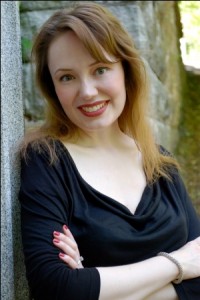 Hilary Davidson: There’s a big difference between what you’ve heard and what really happened. The Cinderella version is that I published my first short story in Thuglit, legendary agent Nat Sobel read it, and then his partner, Judith Weber, sold The Damage Done in a two-book deal to Forge. Technically that’s true, but the reality was more like this: I wrote a book that failed to sell and is now buried in a hard drive somewhere. After that, I tried working on short stories, and spent more than a year getting rejected by everyone. One publication strung me along for almost six months before saying no. I was on the verge of admitting fiction failure when Thuglit stunned me by saying yes to a story. That was “Anniversary,” which did eventually lead to many good things. But it took another ten months for me to get a second short story published.
Hilary Davidson: There’s a big difference between what you’ve heard and what really happened. The Cinderella version is that I published my first short story in Thuglit, legendary agent Nat Sobel read it, and then his partner, Judith Weber, sold The Damage Done in a two-book deal to Forge. Technically that’s true, but the reality was more like this: I wrote a book that failed to sell and is now buried in a hard drive somewhere. After that, I tried working on short stories, and spent more than a year getting rejected by everyone. One publication strung me along for almost six months before saying no. I was on the verge of admitting fiction failure when Thuglit stunned me by saying yes to a story. That was “Anniversary,” which did eventually lead to many good things. But it took another ten months for me to get a second short story published.
PCN: All right, I shall abstain from shoving for now. You’ve published many non-fiction books, short stories, magazine articles. How was writing this novel different from those other experiences? What was easier? Harder?
HD: A lot of the non-fiction work is what I call “paint by numbers” journalism. There’s a set format, whether it’s a guidebook or a magazine article, and you know what your audience wants. It’s pretty easy to do when you get the hang of it. Short stories take me draft after draft to get to a point where I feel like they’re working. But a novel? Let me put it this way: I feel sorry for my husband because he has to live with me while I’m writing novels. When I start one, I know where I’m beginning, and I have a vague sense of the ending, and everything in-between is a mystery. My brain dwells on that mystery and the real world recedes bit by bit. While writing a book, I’ve been known to get lost on the way to a friend’s apartment (a place I’ve been only 50 times or so) and wander into traffic.
PCN: I do that all the time and I’m not even writing a book! I’ll blame it on writing this blog. You’ve traveled all over the world. What are some of the most mysterious, seductive places you’ve ever visited?
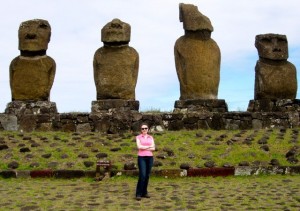 HD: The most mysterious was probably Easter Island, in that there are lots of theories about those giant statues there, but no one actually knows much of anything. Even the few remaining Easter Islanders can’t read the texts from the island’s glory days. But it’s a beautiful place, and the night sky is so clear you can see a glowing band of light cut through the sky at night — that’s the center of our galaxy. I’m an astronomy nerd from way back. I’m also a sucker for ruins, so I fell in love with Turkey. Before I visited, I hadn’t realized about half of the Roman Empire sits in what is modern-day Turkey.
HD: The most mysterious was probably Easter Island, in that there are lots of theories about those giant statues there, but no one actually knows much of anything. Even the few remaining Easter Islanders can’t read the texts from the island’s glory days. But it’s a beautiful place, and the night sky is so clear you can see a glowing band of light cut through the sky at night — that’s the center of our galaxy. I’m an astronomy nerd from way back. I’m also a sucker for ruins, so I fell in love with Turkey. Before I visited, I hadn’t realized about half of the Roman Empire sits in what is modern-day Turkey.
 But my very favorite place may be Peru, which has Inca ruins, stunning colonial architecture, the Andes, amazing art and food, and llamas. You can’t beat llamas.
But my very favorite place may be Peru, which has Inca ruins, stunning colonial architecture, the Andes, amazing art and food, and llamas. You can’t beat llamas.
PCN: Have you ever been in a Turkish prison?
HD: No Turkish prison, but I have been inside a Turkish harem!
PCN: Even better! Why do you love cemeteries and brothels?
HD: I was quiet about my love of cemeteries for years, but I outed myself when I wrote a book of New York City walking tours and snuck in one of Brooklyn’s Green-Wood Cemetery. There was a debate over that, but my editor stood behind me and the tour made it into the book. Later, I found out my editor was a member at Green-Wood. There are lots of secret cemetery admirers around — I’m just more vocal about it. Green-Wood has great views (you can see the Statue of Liberty from there), a man-made lake (like Central Park’s), rolling hills and leafy trees, stunning statues everywhere…what’s not to like?
PCN: That sounds much nicer than my neighborhood.
HD: Ancient brothels, like what I saw when I visited Pompeii, are interesting, too. In history classes, the focus is on wars and speeches and philosophy. Everything sounds so grand. Then you visit, and you realize these ancient towns were filled with peepshows and brothels, kind of like Times Square before they cleaned it up. It’s a whole other side of history you don’t usually read about.
PCN: In Pompeii, there’s a penis etched in stone pointing the way to a brothel. Did you try to pull it out to see if you were the chosen one, a la King Arthur? It didn’t work for me.
 HD: Hmm. I just took photos, actually. But now I’m on the lookout for similar signs at ancient sites. When I went to Ephesus, the “this way to the brothel” sign was an etching of a foot next to a “portrait” of a woman. I was disappointed, to tell you the truth. Too classy.
HD: Hmm. I just took photos, actually. But now I’m on the lookout for similar signs at ancient sites. When I went to Ephesus, the “this way to the brothel” sign was an etching of a foot next to a “portrait” of a woman. I was disappointed, to tell you the truth. Too classy.
PCN: It doesn’t even make sense. A penis sign is much clearer. Now, you have a reputation for writing dangerous females. What qualities do you share with your femmes fatale? Don’t be shy–I know about your krav maga and karate! How are you different from the ladies you write about?
HD: I have two brothers and we grew up taking karate classes together. Since then I’ve studied krav maga and dabbled in other martial arts. This is something I have to be careful about when I write: most people don’t know how to break out of a chokehold. In The Damage Done, Lily’s had a very rough past, and she and her sister — the person she’s searching for in the book — have had some violent clashes. When I played them out in my mind, I had to forget what I would do in a fight, and think of how a normal person who hadn’t trained for years in a dojo would react.
There are things we share. Lily and I love old movies and travel — she’s even a travel writer, though a much more exciting, globetrotting one that I ever was. We also have the same taste in clothes. If we met in some parallel universe, we’d want to raid each other’s closets for the vintage finds.
PCN: Your next novel features Lily in the aftermath of events that occurred in Damage Done. Will she be a series character? Was that always your intention?
HD: When I was writing The Damage Done, I had vague ideas about writing two other books with Lily. She’s someone who’s constructed this very glamorous identity for herself, and she keeps a lot hidden because she’s ashamed of her past and her family problems, which run the gamut from mental illness to alcohol and drug abuse. That identity unravels in The Damage Done, and I wanted to explore where she goes from there. I was absolutely thrilled that my Forge editor wanted to do a two-book deal, because it gave me permission to follow this hazy yet powerful impulse.
PCN: What are your plans for pub day?
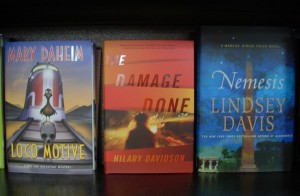 HD: I was going to hunt down a copy of The Damage Done at a bookstore and take pictures, but I’ve already embarrassed myself by doing that at the Barnes & Noble in Union Square on Friday night. On pub day, I’ll be having a party at Partners & Crime in Greenwich Village with two other authors, Joelle Charbonneau and Joshua Corin. Aside from that, I will be working because the truth is, I am a nerd.
HD: I was going to hunt down a copy of The Damage Done at a bookstore and take pictures, but I’ve already embarrassed myself by doing that at the Barnes & Noble in Union Square on Friday night. On pub day, I’ll be having a party at Partners & Crime in Greenwich Village with two other authors, Joelle Charbonneau and Joshua Corin. Aside from that, I will be working because the truth is, I am a nerd.
PCN: Nerds rule! Thanks so much, Hilary, for chatting with us on the eve of your big day. I wish you a huge launch and magnificent book tour.
Fellow nerds, mobilize and support this book! Go see Hilary on tour by checking details here.
Now, for giveaway rules. One reader will be randomly selected to receive a copy of The Damage Done that Hilary will sign and personalize. To enter:
- be e-mail subscriber or Twitter follower (new subscribers get 1 entry, current followers automatically get 2)
- leave a comment about something you fixed that everyone thought had been irreparably damaged
- have U.S./Canada address
Giveaway ends next Monday, October 4, 5 p.m. PST. The winner will be randomly chosen via Random.org and announced here and on Twitter. He/she will have 48 hours to claim the prize before an alternate name is chosen.
]]>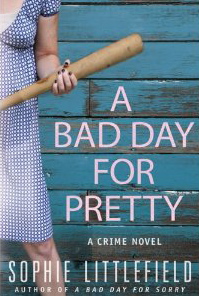 Today sees the release of Sorry‘s sequel, A Bad Day for Pretty, and I’m thrilled Sophie has agreed to another chat. Last time, she brought beer and fried chicken for everyone; this year she’s giving away free books! (Details below the interview.)
Today sees the release of Sorry‘s sequel, A Bad Day for Pretty, and I’m thrilled Sophie has agreed to another chat. Last time, she brought beer and fried chicken for everyone; this year she’s giving away free books! (Details below the interview.)
PCN: How has your life changed since you became a published author last year? Do your kids have rock ‘n’ roll tees with your picture and tour dates on them?
Sophie Littlefield: Oh, PCN, you silly. My kids take pains every day to let me know that to them, I’m still the same old Mom they have always known and loved. They make sure I know I’m welcome to do all the same chores and errands I always did. At 9:45 p.m on a recent school night: “Mom, I need to you to go to CVS and get Wite-Out and those pretzels with the cheesy stuff. I’m kinda waiting for the new South Park to come on so I’ll just stay here.”
I’ve definitely been enjoying getting out and traveling a little more, though I was in Times Square a month ago, trying to hail a cab, when my cell phone rang and it was my son. “Mom? Lacrosse practice ended. Where ARE you?” I suggested he ask his dad, which got me an indignant “But Dad’s working!”
PCN: I suppose you wouldn’t want to respond you were also working on the streets of Times Square.

Sophie (in red) with her publicist Sarah Melnyk (L) and editor Toni Plummer (R)
SL: Ha! No, probably not. There’s been lots of glamour, too. I texted my daughter a snapshot from a dress-up awards banquet and she texted back “wht is goin on w ur boob?”
They’re not really picking up on the whole “Mom’s got a life now” thing, but there have been some sweet moments. Like when my last ARC of PRETTY vanished. I was searching frantically for it when my son said, “Oh I gave it to this girl at school who had a seizure.” I think what I love most about this story is that he doesn’t even know her very well, but his first thought when he found out she had to go to the hospital for tests was “I know just what will cheer her up—a book about a vengeful housewife!” (She’s doing fine, by the way.)
PCN: I love that story! What has surprised you the most about your post-publication life?
SL: In all seriousness, it surprised me how right I was about something you and I talked about last year. Remember how I told you I was getting a lot of, erm, unsolicited advice on how to run my career?
PCN: Uh huh. And I instantly disliked the people giving it.
SL: Well, I stuck to my guns and did what I thought was best, keeping my fingers crossed, and in EVERY instance, going with my intuition turned out to be exactly the right thing to do. I’m not saying I have any answers for anyone else, but for me, trusting myself and my few carefully chosen advisors paid off.
PCN: Hooray! There’s a line in Pretty: “The less a woman has to lose, the quicker you better get out of her way.” At what points in your life have people had to get out of your way the quickest?
SL: For a long long time, no one had to get out of my way at all. I’d come upon them blocking my path…and I’d be all “Oh, I’m sorry, I’ll just go around you and try not to make too much noise and can I make you some coffee while I’m here?” even if it meant a detour that cost me time, effort, even pride. I really, really wanted everyone to like me, too, and I allowed their censure or criticism to devastate me.
Then a few things happened. I got sorta middle-aged. Teenagers appeared in my house. A series of reversals required that I earn some actual cash. Suddenly I didn’t have the time or patience to go around making sure everyone was comfortable and happy, that everyone’s feelings were being taken care of, that everyone’s slice of pie was exactly the same fucking size. Oh yeah, deciding my kids were old enough to hear the occasional cuss word might have been a part of it. Uh, that one kind of snowballed.
PCN: Will we ever see a prequel dealing with Stella living with her nightmare husband and leading up to the moment she snapped? I’d like to see how Stella became STELLA.
SL: Oh, wow! I never thought of that! I would have to wait for a day when I was having a “rage spike,” and just channel it into the story. The only problem is that rather than being a nice “bondage cozy,” it would be more like a Tarantino film, with those scenes where you’re looking around the theater at the other folks wondering if it’s okay that you just laughed or if you’ve just outed yourself as the kind of person who shouldn’t be allowed around children.
PCN: We should go to movies together and laugh at all the wrong stuff! You’ve said Stella is a lot like you. Now that you’re less frustrated with a thriving career, will Stella continue to mellow or will you have to dig deeper for her fury?
SL: It’s kind of funny that everyone—all my pre-pub reviews—seems to agree that Stella is a lot mellower in Book Two. But they also seem to agree that’s a good thing. One reviewer said that dialing back the action somewhat allows the book to focus more on character development.
I’ve been telling my agent that once I’m raking in the big bucks and am missing that adrenaline surge from wondering when they’ll be turning off the lights, I won’t be able to write any more. Gotta stay lean and agile…
PCN: You’re at least staying busy. Besides Stella, you’ve got a YA novel, Banished, coming out in October and Aftertime, a zombie post-apocalyptic story due in March next year, the first in a three-book deal. It’s being published by Luna, Harlequin’s sci-fi/fantasy imprint, so does that mean we’re gonna see some zombie lovin’?
SL: Ahhh, those zombies! Folks either love ‘em or hate ‘em. I have to say that for me, they are merely an interesting way to introduce drama into a character-driven story. (e.g. “I love you Maud,” “I love you, too, Gerald-oh-my-god-what-is-that-thing-taking-a-bite-of-your-leg-aaaaahhhhhh!”) In both my young adult and my Luna series, the zombie plot takes a back seat—a very far back seat—to the human drama.
In Banished, it has to do with growing up feeling isolated and alone, and what happens when you reach the brink of adulthood and you have to step up and face your fears while discovering who you really are.
In the Luna books, the post-apocalyptic world, with all of its challenges—yes, including creatures who want to eat you—is just a dramatic backdrop for a story having to do with loss, grief, and reinvention of the self. And there are some really hot ummm…love scenes, NOT with zombies because everyone knows that zombies don’t have sex (S.G. Browne’s wonderful Breathers notwithstanding).
PCN: I didn’t know that! It would’ve been a great excuse when a friend asked me to play a hooker going oral on a zombie in his movie and I really, really didn’t want to (I’m not joking and no, I didn’t do it). What other genre-busting mash-ups would you like to tackle?
SL: Oh, PCN, have I told you about the collaboration I’m doing with Mr. Zombie Boy (aka Steve Hockensmith)? Steve is convinced that swamp creatures are the new black, and I’ve become laser-focused on Malcolm Gladwell’s economic analysis. We’re doing some awesome things with that, kind of a bayou-legend-meets-Tipping Point story with a lot of heart.
Alternatively, I have this insanely good idea for a book that I plan to start writing on January 1 of next year. I just get so excited thinking about it that I can barely get my trembling fingers to type words. It’s something new and different and it’s either brilliant or leaden and unreadable, I can’t decide which.
PCN: I can’t wait to see how these Frankenstein babies turn out. Now, “sorry” and “pretty” have had their bad days. What adjective is next in Stella’s sights and when is that day happening?
SL: The next two Stella books are scheduled for spring 2011 and 2012. The third one’s turned in and the fourth is “in development.” As for titles…PCN, I have this great source who comes up with brilliant title ideas, but she demands secrecy. So let’s leave the cloak of mystery unmolested, except to say that she is a lady of a certain age who may or may not have ties to the Polish mafia.
PCN: I normally enjoy molesting mystery cloaks but for you, I’ll leave it alone for now. Thanks so much for chatting!
For more about Sophie, visit her website. Click on “blog” from her adult section (not THAT kind of adult) and you’ll be directed to the 79 other sites she writes for. Her tour dates are here.
Now for the giveaway. Sophie has graciously offered to give away one paperback copy of Sorry and one hardcover of Pretty. The first name randomly drawn will get Pretty, the second winner will receive Sorry, both books will be signed. If you haven’t read Sophie yet, better jump on the bandwagon now while there might still be room. Otherwise, you’ll have to walk alongside and get kicked by the donkey pulling the wagon.
Rules:
- be e-mail subscriber or Twitter follower (current subscribers/followers automatically get 2 entries; if you tweet about this, you’ll get 3)
- leave a comment about a bad day you had that ended up being pretty
- have U.S./Canada address
Giveaway ends Monday, June 14, 5 p.m. PST. Winners will be randomly chosen via Random.org and announced here and on Twitter. Winners will have 48 hours to claim the prize before alternate names are chosen.
Let’s get some pretty in here!
]]>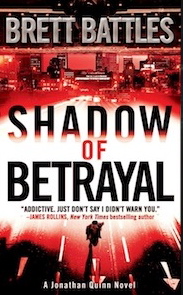 When not world-exploring and engaging in derring do, he writes the Jonathan Quinn series about a cleaner employed by a nebulous government faction to dispose of bodies. Besides being twistily plotted and action-packed, the novels take place in exotic locales, captured in vivid details from Brett’s own travels. The third book in the series, Shadow of Betrayal, comes out in paperback tomorrow (May 25) and Brett’s giving away two signed copies.
When not world-exploring and engaging in derring do, he writes the Jonathan Quinn series about a cleaner employed by a nebulous government faction to dispose of bodies. Besides being twistily plotted and action-packed, the novels take place in exotic locales, captured in vivid details from Brett’s own travels. The third book in the series, Shadow of Betrayal, comes out in paperback tomorrow (May 25) and Brett’s giving away two signed copies.
But first, he parachuted in for a nerd chat.
PCN: Settings for your books include San Francisco, L.A., Saigon, Berlin, D.C., Singapore—all places I’ve spent time in. Why is Quinn stalking me?
BB: Simple. In Quinn’s line of work, it’s all about the preparation. Making bodies disappear is not something you just do on a lark. Knowing as much as possible about an operation is essential to performing flawlessly. That, of course, includes getting a good look at future…eh…projects. (Height, weight, that kind of thing.) Oh, and best of luck on your future travels!
PCN: Um, I think I’ll use the fake passport and gain 60 pounds before my next trip. Both you and Quinn travel a lot. How would he dispose of a body on a plane if he had to? No particular reason why I ask, because I never encounter annoying people on planes.
BB: Well, it’s not like you can just open a door and throw the body out. I think the key would be to make it appear to other passengers (and crew members) that the body is still alive, like he’s just dozing. But make sure his seat belt is on and his chair is all the way up so a flight attendant doesn’t try to wake him. Then it’s a quick trip to the toilet where, despite FAA regulations, you put in a call to one of your team members who then arranges to have someone pretending to be a doctor waiting at the gate. From there it’s just a case of a passenger who’s taken ill and needs assistance getting out. Done and done.
PCN: Brilliant! I’ll make note of that. I sometimes feel like a cleaner because friends often call me to get them out of jai–I mean, pick them up from airports. Are you the cleaner type, the guy who likes to get dirty, or both?
BB: Wow…it all depends on the context in which that question is asked, doesn’t it? Let’s just say I’m whatever I need to be in whatever situation I find myself. (HA! God, if only I was that clever!)
PCN: Your writing process sometimes involves sitting outside taking pictures and/or just letting a video camera capture life as it happens. What’s the juiciest thing you’ve caught on tape that ended up in one of your books?
BB: Well, there was this one time I found myself invited to a barbeque at this politician’s house, so I thought I’d take some photos and video. Who knew that when I opened the study door, I’d find him and– Wait, I forgot. By the terms of our settlement I’m not actually supposed to talk about that. Let’s just say the video function on my camera works very well in low light. I did get a photo of Paris Hilton checking out the self-help/relationship section at Barnes & Noble. True story.
PCN: She can use some self-help all right. You’ve said one of your favorite words is “kit,” because “someone who has a specific kit usually is a pro at what they do.” What’s in your writer’s kit besides giant 2.5-feet Post-Its? And why so big?
BB: I LOVE my giant Post-Its! When I’m working out the plot of a book you could come into my place and see several of them plastered on my walls. My other favorite thing is my dry erase board, also for plotting. I fill it with stuff, take a digital photo of it, transfer the photo to my iPad, then erase the board and start filling it again. My dream is to have a workspace someday where an entire wall is dry erase board. We had that at my old day job and it was AWESOME!
Here’s a partial list of my kit:
Giant Post-Its with multiple color Sharpies
Dry erase board with multiple color pens
Canon digital camera
Canon digital waterproof camera
Cheap HD palm-size video camera
iPad (I can’t believe how much I’m using this already)
iPhone
Laptop
Eyes for observing
Feet to wander around on
PCN: Love it. I already have eyes and feet so that gives me hope. I started reading your books after you got my attention on Twitter with tweets about burritos and grilled cheese sammys, which makes you one shrewd tweeter [he posts pictures, too]. How has social networking affected your relationship with readers?
BB: What social networking has done is not only narrow the gap between authors and readers, it’s pretty much destroyed it, which I am actually in favor of. Just yesterday I was exchanging messages on Facebook with a reader in Romania who listens to audio versions of my books. In the past, readers would have had to rely on sending letters to publishers who would then hold onto them for months before forwarding to the author. Now, my potential audience can reach me directly, and same day. Also, since writing is such a solitary task, social networks like Twitter and Facebook act as a kind of way to stay connected even when all I’m doing is writing in my dinning room. I could have dozens of conversations in a day and never actually speak a word. Wait…not sure that’s a good thing.
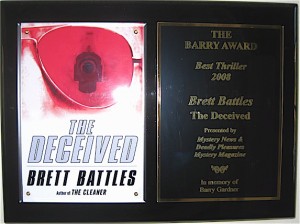 PCN: The Deceived [second Quinn novel] won the Barry Award for Best Thriller of 2008. Ever carry the award around to get free beer or cut in line at Disneyland?
PCN: The Deceived [second Quinn novel] won the Barry Award for Best Thriller of 2008. Ever carry the award around to get free beer or cut in line at Disneyland?
BB: Why carry it around when I have a life-size, full-color reproduction tattooed to my chest?
PCN: Wow. I didn’t know you were the guy with the Barry tattoo. You have a standalone coming out next year called No Return. Can you tease us with a storyline? How was writing it different from writing the series?
BB: Let me give it a try:
What happens when you return to your hometown after seventeen years, only to witness the crash of a Naval fighter jet? What happens when the man you tried to save from the crash isn’t the man the newspapers and Navy claimed died? What if they don’t want you talking?
And what if they aren’t the only ones?
Set in the upper Mojave Desert north of Los Angeles, No Return tells the story of television cameraman Wes Stewart and the journey home he should have never taken.
How’s that?
PCN: That’s summer-action-movie-trailer good.
BB: Okay, how is writing a standalone different from a series? Well, the biggest difference is with my series I have characters I come back to time and again. I know their stories. I know how they think. And I know how they will react in given situations. With the standalone, every character is new, as is every relationship and every reaction. I love writing both.
PCN: I like how even though you’re a thriller writer, you attended the Romantic Times Booklovers Convention this year and paraded around in your underwear. What was that about? Part of your campaign for the Mr. Romance Cover Model contest?
BB: No comment. But I should have won! Dammit!
I think he should’ve won, too, just to see what he’d do with a loin cloth and hair extensions. Deep thanks to Brett for subjecting himself to this interview and providing pictures. For more info, visit his website and Murderati, where he contributes a post every other Thursday.
Brett has generously offered to send two copies of Shadow of Betrayal to a couple lucky readers. He’ll also personalize them and his handwriting is supposedly nicer than a girl’s.
Requirements for entering the giveaway:
- be a PCN subscriber or Twitter follower (if you tweet about this giveaway, you’ll get 3 entries)
- leave a comment about a situation when you had to clean up someone else’s mess
- be a U.S. or Canada resident
Giveaway ends Wednesday, June 2, 5 p.m. PST. Winners will be randomly chosen via Random.org and announced here and on Twitter. Winners will have 48 hours to claim the prize before alternate names are chosen.
Good luck!
]]>